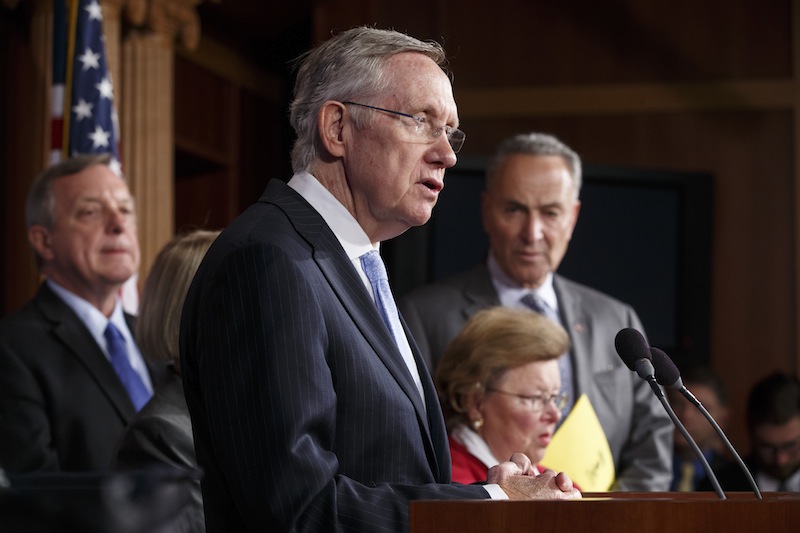The Democratic-led Senate is expected on Monday afternoon to rebuff the latest temporary spending bill passed by the House, keeping the pressure on House Republicans just hours before a federal government shutdown at midnight.
Democrats will bring up one motion to table the GOP’s amendments to delay Obamacare for a year, repeal the law’s medical device tax and allow employers to opt out of contraception coverage for employees, leadership aides say. It would require 51 votes. House Republicans were furious that Senate declined to return to session Sunday after the lower chamber voted to amend the continuing resolution late Saturday night.
“The Senate will do exactly what we said we would do and reject these measures,” said Adam Jentleson, a spokesman for Senate Majority Leader Harry Reid (D-NV), on Sunday. “At that point, Republicans will be faced with the same choice they have always faced: put the Senate’s clean funding bill on the floor and let it pass with bipartisan votes, or force a Republican government shutdown.”
Reid has united his 54-member Democratic caucus in rebuffing Republican efforts to attach extraneous provisions to the Senate’s “clean” continuing resolution. After the Senate acts, House Republicans would have time for one more vote. They could insist on more provisions Obamacare and risk a shutdown or swallow the clean stopgap bill. GOP leaders wanted to avoid risking a shutdown over Obamacare, aware that polls say they would probably be blamed for it, but they’ve been coerced by their right flank.
“I believe the Senate’s going to send a clean CR. Then will be the moment of truth,” Rep. Gerry Connolly (D-VA) said Monday on MSNBC. “Will we amend it a third time knowing that that is tantamount to shutting down the government?”
House GOP leaders haven’t decided what they’ll do. They’re exploring options such as attaching only the medical device tax repeal (which most Senate Democrats want to repeal) or a measure that would deny subsidies under the Affordable Care Act for lawmakers and staff, aides say. There’s also an outside possibility that House GOP leaders will swallow a “clean” CR, but that amounts to surrender and would infuriate the conservative movement.
The two parties have agreed to temporarily fund the government at the current austerity level of $986.3 billion, a victory for conservatives who want to maintain the so-called sequester. Absent agreement on other provisions, the federal government would partially shut down for the first time in 17 years at midnight, putting hundreds of thousands of federal workers on furlough as services like national parks and museums close their doors. Members of Congress would still be paid.
Rep. Tom Cole (R-OK), a deputy majority whip and ally of Speaker John Boehner (R-OH), said Monday that a shutdown would hurt the GOP. “Politically, that could well be to [Democrats’] advantage,” he said on MSNBC.






